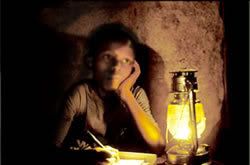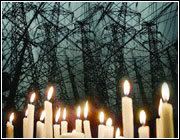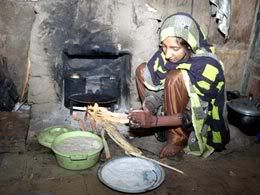 Everyone these days seems to be talking about the elections, the tragic death of Benazir Bhutto and its impact on federation of Pakistan, the ever high anti Pakistan and anti Army sentiment in Sindh, Balochistan and FATA. The ordinary Pakistanis, middle and lower class in particular, are faced with a long list of other serious crises (making their daily lives a misery) which, unfortunately, have got very little attention. Latest in the list are the Power crisis/Load-shedding, water, Sui Gas and Flour or Wheat crisis.
Everyone these days seems to be talking about the elections, the tragic death of Benazir Bhutto and its impact on federation of Pakistan, the ever high anti Pakistan and anti Army sentiment in Sindh, Balochistan and FATA. The ordinary Pakistanis, middle and lower class in particular, are faced with a long list of other serious crises (making their daily lives a misery) which, unfortunately, have got very little attention. Latest in the list are the Power crisis/Load-shedding, water, Sui Gas and Flour or Wheat crisis.
The Power crisis or Load-shedding has been so severe since last 2 weeks or so that here in Lahore, we feel like living in caveman’s era. After every 30 minutes electricity goes off and we have to sit in the candle lights (except for the 5% who have generators:)) and wander around in the darkness. There are many areas of old city which are often without any electricity, gas or water for entire day in this extremely cold weather.
 There have been difficult situations since the creation of Pakistan but I don’t think ever before so many crises have hit us in such quick succession. During last two years, particularly, we have seen nothing but crises, one after the other, and not a single one handled properly by government. It wouldn’t be wrong if we remember 2007 as a Year of Crises for Pakistan. On most occasions, authorities could have controlled situation by strict administration and better management. The inability to act and indifferent among the top government officials on these serious issues is astonishing, especially when elections are just around the corner. How can Q-league candidates even think of coming to people and ask for votes considering the terrible situation after their 5 years rule? Or may be enough votes have already been managed . Everybody seems to be interested in power game and political survival and there is no plan of action to handle the very basic problems. Nobody is coming forward from government authorities, explaining the cause of, for example the flour crisis, and informing public on the actions being taken to improve the situation.
There have been difficult situations since the creation of Pakistan but I don’t think ever before so many crises have hit us in such quick succession. During last two years, particularly, we have seen nothing but crises, one after the other, and not a single one handled properly by government. It wouldn’t be wrong if we remember 2007 as a Year of Crises for Pakistan. On most occasions, authorities could have controlled situation by strict administration and better management. The inability to act and indifferent among the top government officials on these serious issues is astonishing, especially when elections are just around the corner. How can Q-league candidates even think of coming to people and ask for votes considering the terrible situation after their 5 years rule? Or may be enough votes have already been managed . Everybody seems to be interested in power game and political survival and there is no plan of action to handle the very basic problems. Nobody is coming forward from government authorities, explaining the cause of, for example the flour crisis, and informing public on the actions being taken to improve the situation.
 The year 2008 has brought several gifts for Pakistanis including the Bijli, Paani, Sui Gas and Aata Buhraan (power, water, natural gas and flour crises). Yes water too because not many people understand the connection between water supply with the availability of electricity in Pakistan. The tube-wells which supply water to most cities are run by electricity. I remember about 2-3 years ago, when there used to be criticism on Muslim League (Q) Government that all decisions are made somewhere else and they just say Yes Boss (dummies). Mr. Musharraf gave an interview on Geo and highlighted the point that he doesn’t interfere at all in government operations and the only things he looks after is the war against terrorism and the future power needs of Pakistan. I am sure many of you remember the presentations and news clip from aiwan-e-sadr (Presidential Palace) which used to appear on news channels daily and then the press briefings with claims of new dams (including Kala Bagh dam) to be built and a plan has been made to fulfill Pakistan’s power needs for next 20 years. So, what happened to our tax money that has been wasted on funky presentations and planning and no actions and results?
The year 2008 has brought several gifts for Pakistanis including the Bijli, Paani, Sui Gas and Aata Buhraan (power, water, natural gas and flour crises). Yes water too because not many people understand the connection between water supply with the availability of electricity in Pakistan. The tube-wells which supply water to most cities are run by electricity. I remember about 2-3 years ago, when there used to be criticism on Muslim League (Q) Government that all decisions are made somewhere else and they just say Yes Boss (dummies). Mr. Musharraf gave an interview on Geo and highlighted the point that he doesn’t interfere at all in government operations and the only things he looks after is the war against terrorism and the future power needs of Pakistan. I am sure many of you remember the presentations and news clip from aiwan-e-sadr (Presidential Palace) which used to appear on news channels daily and then the press briefings with claims of new dams (including Kala Bagh dam) to be built and a plan has been made to fulfill Pakistan’s power needs for next 20 years. So, what happened to our tax money that has been wasted on funky presentations and planning and no actions and results?
Well, the result is that after last year’s nightmare situation in Karachi and some other parts of the country, now there is a serious Power Crisis in the ENTIRE country. Here in Lahore, we are facing load-shedding up to 7-8 hours a day in urban areas (that is in Lahore) and things are not improving. Initially the load-shedding was for 30 minutes after every 2 hours but since last week, they do it after every 1 hour during the day time and every 30 minutes after 5 PM (for 30 minutes mostly and 1 hour in between). The most irritating part of this load-shedding is that NO schedule whatsoever has been published for people to know and try to manage things in a better way. I was watching Geo and they were showing reports of rural areas of entire country where they are getting electricity for only 2-4 hours a day. Every indication of things getting even worse in January/February. Well, welcome to 2008.
Daily Times filed this report on load-shedding:
The Water and Power Development Authority (WAPDA) has decided to increase the timing of load shedding with a seven-hour shutdown on regular basis from Tuesday (today), officials told Daily Times on Monday.
The officials said that the authority was facing a shortfall of around 3,000 megawatts and that it had decided to increase the load shedding in rural and urban areas. Pakistan requires around 11,000 megawatts per day, while the per day availability is around 8,000 megawatts.
The officials said that the shortfall might increase to 5,000 megawatts during the upcoming summer, adding that the power deficit was likely to decrease during the start of 2009 because various new power generation projects would be started.
“It has been decided that WAPDA will do five to seven hours of load shedding per day in the rural areas, while four to six hours of load shedding will be done in cities,†the officials added.
The Pakistan Electric Power Company (PEPCO) has asked all distribution companies to increase the load shedding hours to overcome the shortfall. The closure of canals, release of less water by the Irrigation Department and the suspension of gas supply to power generating plants caused the power shortfall, PEPCO Managing Director Munawar Baseer Ahmed said, adding that the load shedding might increase in the coming days if WAPDA did not get gas or water to generate power.
Meanwhile, a cabinet meeting decided on Monday decided that any load shedding interval would not last longer than half-an-hour, Irfan Ghauri adds from Islamabad.
Geo has this report on Flour Crisis:
The flour crisis has intensified as people facing hardships to buy the essential food item on increased price. In Karachi wheat flour, ghee and edible oil have not been available at most of the utility stores. The flour if available at a utility store being sold at Rs.155 ten kilogram instead of the official rate of Rs. 130/-
Long queues of the people can be seen outside the utility stores in the city for flour, ghee and edible oil. The 10-kilogram bag of wheat flour being sold at 155 rupees instead of the official rate of Rs. 130/- at utility stores in the city. The other shops are selling the 10-KG bag of flour at Rs 280/-
The flour price in Zhob, Mastung, Loralai and other parts of Balochistan has hiked, while the food item is unavailable at utility stores in Quetta and other cities of the province. The chief minister of Balochistan has issued directives to the concerned officials for action against hoarders and called report on the issue within two days. According to the provincial secretary food Azam Baloch, 20-KG bag of flour being sold at Rs. 278, at 130 Fear Price Shops in Quetta and at various sale points arranged by the flour mills.
In Peshawar wheat flour is available only at few shops and being sold at Rs. 500 per 20-KG bag. According to the shopkeepers the flour supplies from the mills have decreased. The crowds of people can be witnessed at the utility stores but a spokesman of Utility Stores Corporation has said the stores could not meet the rising demand of the flour.
According to the NWFP Flour Mills Association the crisis was the result of dwindling supplies of wheat and flour from Punjab.
I started to recall the number of crises that we have seen under Musharraf’s regime and the list is really long. I wonder when he leaves office (surely he will leave or forced to leave someday soon), how people will remember him (if they do) and his X years in power. A dictator who gave Pakistan more crises than anyone in history? Here is what I could think of in just 5 minutes:
- Steel Mill
- Stock Exchange
- Law & Order
- Extremism
- Sugar
- Flour
- Electricity and Power
- Crisis of federation of Pakistan
- Political turmoil
- Credibility of state institutions
- Credibility of Armed Forces
- Lal Masjid
- The missing people
- The judicial crisis
- Freedom of speech and media crisis
Readers are most welcome to add to the list.
We are also hearing the news of upcoming Rice Crisis which is expected very soon. Beware all you rice lovers. I just don’t know what is the way out for ordinary citizens of Pakistan? Where is the impact of that economic prosperity and progress? People need things like food, energy, shelter, education, health and security to survive not the mobile phones and leased/financed motorcycles and cars. We have been hearing tall claims during last 5-6 years and I think we have a right to ask questions that where are the results? Whatever it is, some well known people have sure made a LOT of money during that time.
When I look at the current situation of Pakistan, it seems like a Masailistaan. As an optimist, I like to believe that things would be better in future. But just how, that I do not know. Somehow as a nation, we have to figure that out and quickly. Rigged or not so rigged elections may take place next month but how it would bring any positive change in ordinary person’s life remains to be seen. I would like to end this post with Ahmed Faraz’s kalaam which ends on a positive note.




















































The dictator and his regime has been completely unmasked now. But its late now and situation is already worse for Pakistan.
@Viqar
The CDGK has signed a MOU with some Japanese company to covert the Buffalo refuse into electricity. I have read the feasibilty report and it states that cattle colony (bhens colony) in Karachi produces enough buffalo refue (gobar) to produce 50MW of electricity. I do not know what happened to this project.
@ faraz
‘How they are going to budget electric power projects.’
for KESC, if they take out the surcharge and additional surcharge from the bills, the per unit cost of electricity is good enough to fund any big project. The truth is that in our electricity bills the actual cost of electricity is much less than the taxes imposed on them. Merge all the taxes in the per unit cost. But than it will reduce the BIG money goes into our government pockets as taxes.
@ Owais
Your statement that it takes 10 years to build a big power plant is correct in case of hydal power. A thermal generation palnt can be constructed in less than three years. It is all a matter of money. The 600MW power plant in Riyadh KSA is built in less than 2 years. I am a witness as I worked on this project. But than Saudis has all sort of money to buy comfort for their people.
An excellent article by Darwaish.
There was a time, not so long ago, when most people thought that Musharraf was the best thing that had ever happened to Pakistan, just as there are people who even now think that Benazir Bhutto and/or Nawaz Sharif are the most amazing personalities to have ruled this country in recent years. It is an irony of fate that the names most often associated with blatant corruption, nepotism, incompetence, dismal governance, and all-round foot-in-mouth variety of cluelessness, are the same names that are laying claim to Pakistan’s immediate political future.
Musharraf had a once-in-a-lifteime, God-gifted opportunity to set the country right; let history judge him and his actions. To paraphrase, “He entered politics with a brilliant future, and came out with a terrible past.”
“Success has many fathers, but failure is an orphan.”
“The amount of effort that goes in collecting trash, sorting it, storing it and ensuring a constant dependable supply to generate bio-gas which in turn could run electricity generators is a huge effort which requires planning at higher scale. No i have not heard of such effort at govt scale yet”.
Owais,
Honestly, I feel that this is an idea worth pursuing. I had broached the subject with my cousin in Karachi, who was making a strong pitch for me to return to Pakistan, during my visit there in 2004. When I said that I would be interested in setting up an NGO to collect and transport waste from the city, he threw up his hands and told me that I would not get the permission to do so from the municipal authorities.
I do not wish to go into the circular back and forth we went thru, but I dropped the subject and that was that.
I have heard of this gentleman in Pak by the name of Q. Isa Daudpota who is, apparently, into environmental issues. Do you know him or have any contact information about him? I was wondering if he could help?
Viqar Sahib, domestic waste has been used in building mini-bio-gas plants which can possibly be used to generate electricity but with low efficiency. The amount of effort that goes in collecting trash, sorting it, storing it and ensuring a constant dependable supply to generate bio-gas which in turn could run electricity generators is a huge effort which requires planning at higher scale. No i have not heard of such effort at govt scale yet.
Collecting solid waste from cities in organized way is a huge undertaking with political pit-falls. I remember in early 1990s, Karachi’s city government started a ‘TRASH TRAIN’ which used to collect trash from all over the city (using Karachi circular railway) track and then dump it near the Steel Mill at a siding especially created for Karachi’s solid waste disposal. Believe it or not, it became a political issue with representatives from Karachi East complaining against Karachi city dumping its trash in their area (and may be rightly so) b/c the project was started without removing concerens of Karachi east. The trash train project got abandoned within months of its service.
In Zia-ul-Haq time, i do remember govt promoting local bio-gas plants at home or street level which could replace Sui Gas. You may remember the PTV campaign for bio-gas plants in early or mid 1980s. I never heard of anyone building such plants in city areas where Sui Gas was available.